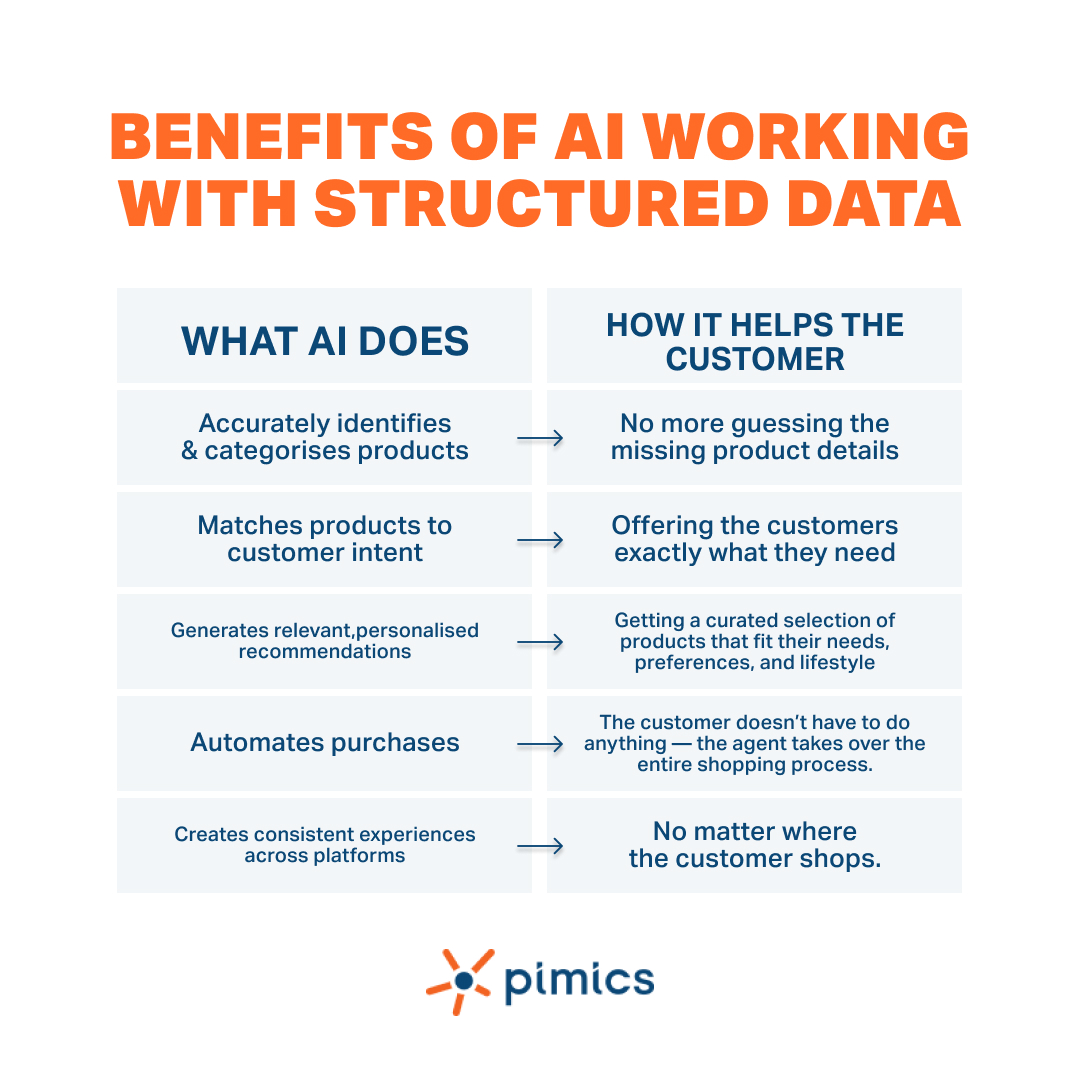For those whose jaws dropped 20+ years ago when the movie Minority Report came out: the time has come! Smart AI tools are revolutionising the shopping experience. Customers no longer scroll endlessly through websites — instead, an intelligent agent acts on their behalf and finds the right products based on a simple prompt like "Find me an eco-friendly waterproof jacket under 150 Euros."
We won’t probably get the Tom Cruise-like experience and get addressed by loudspeakers when shopping in actual stores. Nevertheless, the age of very targeted & tailored e-commerce experience is really here. Experts agree that e-commerce is going through a very transformative era.
The New Competitive Edge
As AI becomes more prevalent, businesses will either thrive or fall behind based on how well they manage their product data. Those that invest in structured product data will:
- Have higher visibility in AI-driven product recommendations
- Achieve better conversion rates through precise product matching
- Avoid cart abandonment caused by missing or unclear information
- Be able to quickly launch new products and promotions
- Adapt to new technologies like virtual assistants or autonomous agents more easily.
On the flip side, those who rely on spreadsheets, legacy systems, or incomplete data will find it tough to compete in an AI-driven world. It’s not just about improving your data, it’s about future-proofing your business.
The Rise of "Agentic AI" in E-Commerce
In simple terms, agentic AI is an AI system that not only responds to a user’s query. It goes way beyond, actively making decisions on the user’s behalf. In the world of e-commerce, this could include:
- Recommending products based on customer's needs
- Comparing technical specifications across competing products
- Automatically purchasing items based on user preferences
- Managing replenishment of frequently bought items
- Negotiating offers and finding the best deals
Again, these systems rely heavily on
well-organised product data to operate effectively. If your data is messy or incomplete, AI will struggle to make accurate recommendations, leaving potential sales on the table.
To tick all the boxes above, agentic AI needs:
- For Intent Matching — structured product data to match a customer’s search intent with the right filters (such as material type, size, price).
- For Product Comparison — consistent data like weight, colour, dimensions, or energy efficiency class. Depends on the product’s category.
- For Bundling & Personalised Recommendations — established and existing relationships between products (such as to be able to recommend a matching backpack to someone who has just bought a set of hiking boots).
- For Automated Purchases — structured lifecycle data to be able to reorder items.
- For Personalised Experiences — data on product certifications, origin, and sustainability, which allows AI to recommend products based on what matters to your customers.
The AI agent works well only when the data behind the products is well-structured and easy to interpret. That’s where the trouble lies for many businesses — they simply don’t have their product data organised and formatted in a way that AI can use effectively.

Without structured data, AI is left to make assumptions, leading to errors, missed opportunities, and potentially frustrated customers.
Structured data empowers AI to make the right decisions, deliver personalised experiences, and significantly improve your business’ performance.
Structured Data: The New Front Door to E-commerce
We keep talking about the importance of data because with such a massive rise of AI, data will soon become the new company gold. You cannot expect AI to help you much if your data is a mess. Even the most advanced AI tools are only as good as the data you feed them with.
→ OUR TIP: We’ve already explained why it’s wise to sort out your data in the first place in our article addressing the E-Commerce vs PIM Dilemma: Why Data Comes First.
The key to unlocking AI's potential in your company processes (such as in your e-commerce operations) is having structured product data that AI can seamlessly work with. Without it, your AI system will be just as confused as a human trying to navigate an online store without proper product descriptions. Ever had a new junior employee navigating their way around? You certainly don’t want your precious (and not so cheap) AI tools to behave like that. With messy data, they would.
Think of your product data as your storefront in the world of AI-driven commerce. Just as you’d never leave a physical store messy and unorganized, you can’t afford to let your digital storefront be chaotic. If your data is organized, enriched, and as machine-readable as they are human-readable, your products will be visible at the right time — when an AI agent is making decisions for a customer.
How Pimics Fit Into the Picture
At Pimics, we focus on helping companies get their product data organized, structured, and ready for the future. Whether you’re looking to implement AI-powered features in your e-commerce platform or expand into new markets, the first step is always cleaning up your product data. It’s like getting a tattoo — it might be a little painful upfront, but it lasts for a lifetime.
Getting your data organised brings benefits to your business for years to come. At Pimics, we’ll guide you through the process every step of the way.